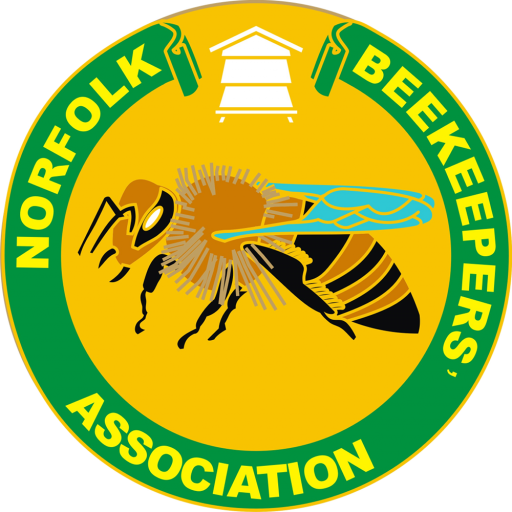If you have a swarm of bees, please read this text before contacting one of the voluntary swarm coordinators for your area. Contact numbers are given at the bottom of the web page.
HONEY BEES are quite dull looking insects with no easily discernible bands of colour. They range in colour from black to golden brown, in Norfolk at least being an uninteresting browny/black. Honey bees will swarm periodically to found a new colony and are the only type of bees to do so. It is not uncommon to experience swarms of 40,000 or so bees but they can be smaller but always reckoned in thousands. They have far more on their minds than attacking humans or domestic animals but should nevertheless be left well alone. Remember, if provoked, honey bees can fly much faster than you can run! Also bear in mind that so-called “killer bees” do not exist in the UK!
If they are all in flight, nothing can be done. However, they will almost certainly start to congregate in a large cluster en route to their new home, often in a tree, shrub or on a wall. They will usually move on within a few hours but sometimes will stay in the cluster for up to a week. Again, they are not a serious risk unless provoked. Sometimes they will take up residence in a cavity wall, a chimney or roof space on your property.
The BBKA web site has further information about swarms in roof and wall cavities.
BUMBLEBEE nests can be found in holes in the ground, cavity walls, bird boxes or under roof eaves. Bumblebees are the least aggressive of the flying stinging insects. They are often quite big and very hairy, with different areas of colour according to their type. Ordinarily, the nest will die out in the autumn and you will have no further problems.
Further information can be found at the Bumblebee Conservation Trust web site.
Swarm Coordinators will not remove bumblebees but may be able to give useful information.
WASPS can be unpredictable and aggressive – leave well alone. They are distinctively black and yellow in clearly defined bands. They will nest in the ground or any convenient space and have been found in shrubs in a protected part of the garden. Their nests are a distinctive spherical in shape and look like grey papier maché. If a pest, please refer to your local council Pest Control Office or a professional pest control company.
Swarm Coordinators only deal with honey bee swarms and not wasps.
OTHER BEES There are other types of bees (e.g. Solitary Bees) which are not normally aggressive. They can usually be left alone.
BEES GENERALLY All bees and wasps undertake valuable work in your garden, either by pollination or controlling other pests. They are in decline, so whenever possible, try to encourage and tolerate them.
CONTACTS Remember that the contacts below can only provide assistance with honey bee swarms. Furthermore, they can only enter property with the consent of the owner/tenant and may not be able to assist where the bees are inaccessible. No charge per se is made for collecting a swarm although the collector may request expenses. Please ring the contact in the Council area where the bees are found.
Before contacting your local swarm collector, please have the following details to hand
- Size of the swarm – size of a rugby ball, a football, a tennis ball.
- Location of the swarm on the property and how accessible it is.
- How long the swarm has been there.
| Area | Contact person | Telephone number |
|---|---|---|
| Breckland | Nigel Bowden | 07484 730888 |
| Breckland | Trevor Nash | 07955 166852 |
| Broadland | Jan Benson | 07801 194102 |
| Broadland | George Male | 07833 431837 |
| Kings Lynn & West Norfolk | Barry Thrower | 07747 426888 |
| Kings Lynn & West Norfolk | Barry Walker-Moore | 07833 915340 |
| Norwich | John Tusting | 07944 709890 |
| Norwich | Kevin Woodruff | 07780 596490 |
| North Norfolk | Guy Pettit | 07717 772850 |
| North Norfolk | Lynne Pettit | 07799 833568 |
| South Norfolk | Denise Drake | 07796 387439 |
| South Norfolk | Tristan Hanwell | 01953 789281 07824 567447 |
